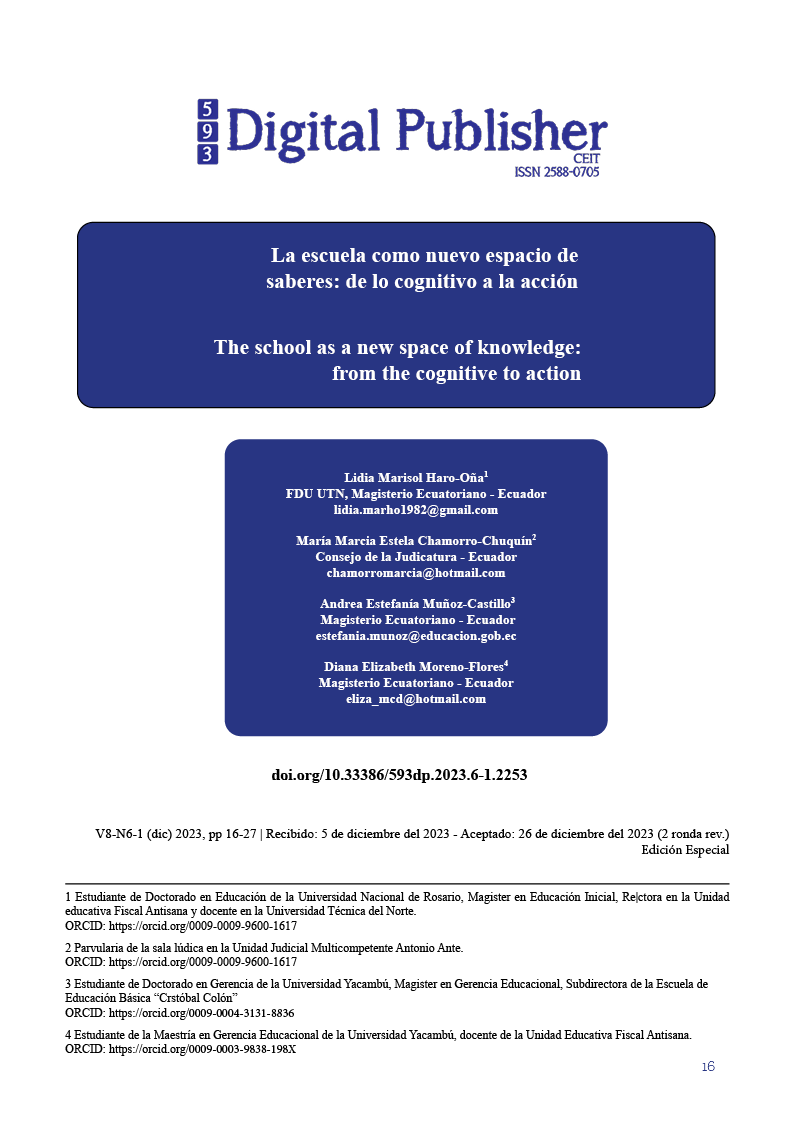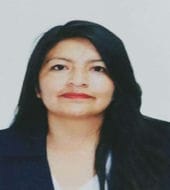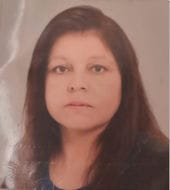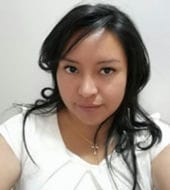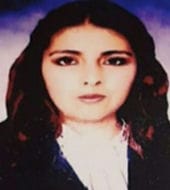The school as a new space of knowledge: from the cognitive to action
Main Article Content
Abstract
This article focuses on the importance of the school in Ecuador as a space, which surpasses the academic approach, becoming an environment conducive to action and the practical application of acquired knowledge. Meanwhile, its purpose is to analyze in a critical-reflective manner how the school in Ecuador can become a bridge of connection between academic knowledge and action, promoting meaningful and relevant learning in its students. Firstly, the traditional approach is examined, focused on the transmission of theoretical knowledge with a limited and bookish vision, which can be unmotivating and far from reality after proposing a school that promotes the practical application of knowledge. In summary, the research highlights the importance of considering educational work as a new space of knowledge that promotes action and practical application of knowledge, in synergy with families and the community in terms of promoting autonomous and motivating learning, which prepares comprehensively to Ecuadorian students to face the challenges of today's world; From such conclusive ideas emerge a set of projections that are presented in the closing of this ontological and epistemological approach.
Downloads
Article Details

This work is licensed under a Creative Commons Attribution-NonCommercial-ShareAlike 4.0 International License.
1. Derechos de autor
Las obras que se publican en 593 Digital Publisher CEIT están sujetas a los siguientes términos:
1.1. 593 Digital Publisher CEIT, conserva los derechos patrimoniales (copyright) de las obras publicadas, favorece y permite la reutilización de las mismas bajo la licencia Licencia Creative Commons 4.0 de Reconocimiento-NoComercial-CompartirIgual 4.0, por lo cual se pueden copiar, usar, difundir, transmitir y exponer públicamente, siempre que:
1.1.a. Se cite la autoría y fuente original de su publicación (revista, editorial, URL).
1.1.b. No se usen para fines comerciales u onerosos.
1.1.c. Se mencione la existencia y especificaciones de esta licencia de uso.
References
Barriga Arceo, F. D. (2006). Enseñanza situada: Vínculo entre la escuela y la vida. México: McGraw-Hill Interamericana. [Documento en línea]. Disponible: https://www.uv.mx/rmipe/files/2016/08/Ensenanza-situada-vinculo-entre-la-escuela-y-la-vida.pdf [Consulta: 2023, Noviembre 25].
Bolívar, A. (2010). El liderazgo educativo y su papel en la mejora Una revisión actual de sus posibilidades y limitaciones. Psicoperspectivas, Individuo y Sociedad, vol. 9, núm. 2. Universidad de Granada. España. [Documento en línea]. Disponible: https://www.psicoperspectivas.cl/index.php/psicoperspectivas/article/view/112/140 [Consulta: 2023, Noviembre 28].
Carreño, M. y Rozo García, H. (2020). Estrategias para desarrollar la convivencia y la paz desde la educación. [Documento en línea]. Disponible: https://revistas.unimilitar.edu.co/index.php/ravi/article/view/4501/4395 [Consulta: 2023, Noviembre 27].
Castillo, J. R. (2016). Docente inclusivo, aula inclusiva. Fundación Educrea. Revista nacional e internacional de educación inclusiva. ISSN (impreso): 1889-4208. vol. 9, núm. 2, pp.264-275. [Documento en línea]. Disponible: https://educrea.cl/docente-inclusivo-aula-inclusiva/ [Consulta: 2023, Noviembre 27].
Colbert, V. (2018). Ruta maestra. Bogotá: Santillana. [Documento en línea]. Disponible: https://rutamaestra.santillana.com.co/docente-como-agente-de-cambio/ [Consulta: 2023, Noviembre 27].
Departament of Health & Human Services USA (2011). Principios de vinculación comunitaria (2da. ed.). NIH Publicación Nro. 11-7803S. [Documento en línea]. Disponible: https://www.atsdr.cdc.gov/communityengagement/pdf/Principles_Community_Engagement_2ndEdition_Spanish.pdf [Consulta: 2023, Noviembre 28].
Díaz Barriga, A. (2005). El enfoque de competencias en la educación ¿Una alternativa o un disfraz de cambio? Revista Scielo, Perfiles Educativos, ol 28, núm. 111, México. [Documento en línea]. Disponible: http://www.scielo.org.mx/scielo.php?script=sci_arttext&pid=S0185-26982006000100002 [Consulta: 2023, Noviembre 28].
Eyzaguirre, S. (2018). El rol de la filosofía en el desarrollo del pensamiento crítico. Punto de Referencia, Edición Digital Nº 485. [Documento en línea]. Disponible: https://educacion.udd.cl/files/2018/08/El-rol-de-la-filosofia-en-el-desarrollo-del-pensamiento-cr%C3%ADtico.pdf [Consulta: 2023, Noviembre 27].
Fondo de las Naciones Unidas para la Infancia (UNICEF) (2018). Aprendizaje a través del juego. [Documento en línea]. Disponible: https://www.unicef.org/sites/default/files/2019-01/UNICEF-Lego-Foundation-Aprendizaje-a-traves-del-juego.pdf [Consulta: 2023, Noviembre 28].
González Jaimes, E. I., Hernández Prieto, M. y Márquez Zea, J. (2011). La oralidad y la escritura en el proceso de aprendizaje. Aplicación del método aprende a escuchar, pensar y escribir. Revista Digital Scielo, vol. 58, núm. 2, versión impresa ISSN 0186-1042. [Documento en línea]. Disponible: http://www.scielo.org.mx/scielo.php?script=sci_arttext&pid=S0186-10422013000200011 [Consulta: 2023, Noviembre 27].
Head Start y Early Head Start (2022). Estrategias del programa para promover la participación de los padres en la enseñanza y aprendizaje de sus hijos. Departamento de Salud y Servicios Humanos de EE. UU. [Documento en línea]. Disponible: https://eclkc.ohs.acf.hhs.gov/es/practicas-docentes/birth-5-father-engagement-guide/estrategias-del-programa-para-promover-la-participacion-de-los-padres-en-la-ensenanza-y-el [Consulta: 2023, Noviembre 27].
López Arrillaga, C. E. (2019). La pedagogía del amor y la ternura: Una práctica humana del docente de educación primaria. Universidad Latinoamericana y del Caribe. Revista Scientific, vol. 4, núm. 13, pp. 261-277. Instituto Internacional de Investigación y Desarrollo Tecnológico Educativo. [Documento en línea]. Disponible: https://www.redalyc.org/journal/5636/563659492014/html/ [Consulta: 2023, Noviembre 27].
Masjuan, J. M. (2004). Practicas escolares y socialización: La escuela como comunidad. Universitat Autònoma de Barcelona. Facultat de Ciències Polítiques i Sociologia. [Documento en línea]. Disponible: https://www.tdx.cat/bitstream/handle/10803/5123/dpa1de1.pdf [Consulta: 2023, Noviembre 27].
Ministerio de Educación de Colombia (s/f). Serie lineamientos curriculares: Educación artística. [Documento en línea]. Disponible: https://www.mineducacion.gov.co/1759/articles-339975_recurso_4.pdf [Consulta: 2023, Noviembre 27].
Ministerio de Educación de Ecuador (s/f). Actualización y fortalecimiento curricular de la educación básica. [Documento en línea]. Disponible: http://web.educacion.gob.ec/_upload/10mo_anio_LENGUA.pdf [Consulta: 2023, Noviembre 27].
_______________________________(2005). Educar para el desarrollo sostenible. [Documento en línea]. Disponible: https://www.mineducacion.gov.co/1621/article-90893.html [Consulta: 2023, Noviembre 27].
_______________________________(2023). El desarrollo infantil y las competencias en la primera infancia. [Documento en línea]. Disponible: https://www.mineducacion.gov.co/primerainfancia/1739/article-178053.html [Consulta: 2023, Noviembre 27].
National Association for the Education of Young Children (2020). Prácticas apropiadas al desarrollo. [Documento en línea]. Disponible: https://www.naeyc.org/sites/default/files/globally-shared/downloads/PDFs/resources/position-statements/dap_ps_spanish.pdf [Consulta: 2023, Noviembre 28].
Osorio M., C. (2002). La educación científica y tecnológica desde el enfoque en ciencia, tecnología y sociedad. Aproximaciones y experiencias para la educación secundaria. Revista Iberoamericana de la Educación, Enseñanza de la Tecnología núm. 28. [Documento en línea]. Disponible: https://rieoei.org/historico/documentos/rie28a02.htm [Consulta: 2023, Noviembre 28].
Parra F., K. N. (2014). El docente y el uso de la mediación en los procesos de enseñanza y aprendizaje. Universidad Pedagógica Experimental Libertador. Instituto Pedagógico de Caracas. Redalyc.org. Red de Revistas Científicas de América Latina, el Caribe, España y Portugal. [Documento en línea]. Disponible: https://www.redalyc.org/pdf/3761/376140398009.pdf [Consulta: 2023, Noviembre 27].
Renzulli, J. S. (2021). El papel del profesor en el desarrollo de habilidades cognitivas complejas en personas jóvenes. Revista Española de Pedagogía, 79(278), 13-32. [Documento en línea]. Disponible: https://revistadepedagogia.org/lxxix/no-278/el-papel-del-profesor-en-el-desarrollo-de-habilidades-cognitivas-complejas-en-personas-jovenes/101400085141/ [Consulta: 2023, Noviembre 28].
Sánchez Dromundo, R. A. (2007). Teoría de los campos de Bourdieu, como esquema teórico de análisis del proceso de graduación en postgrado. [Documento en línea]. Disponible: http://www.scielo.org.mx/scielo.php?script=sci_arttext&pid=S1607-40412007000100008 [Consulta: 2023, Noviembre 27].
Secretaría de Educación Pública y Subsecretaría de Educación Básica (2022). Estrategia nacional para promover trayectorias educativas y mejorar los aprendizajes de los estudiantes de educación básica. Estados Unidos Mexicanos. [Documento en línea]. Disponible: https://educacionbasica.sep.gob.mx/wp-content/uploads/2022/04/6.SUBSECRETARIiA-DE-EDUCACIOiN-BAiSICA_CORR_A.pdf [Consulta: 2023, Noviembre 28].
Silva Quiroz, J. (2010). El rol del tutor en los entornos virtuales de aprendizaje. Innovación Educativa, vol. 10, núm. 52, pp.13-23. Instituto Politécnico Nacional, Distrito Federal, México. Redalyc.org. Red de Revistas Científicas de América Latina, el Caribe, España y Portugal. [Documento en línea]. Disponible: https://www.redalyc.org/pdf/1794/179420763002.pdf [Consulta: 2023, Noviembre 28].
Sunkel, G., Trucco, D. y Espejo, A. (2013). La integración de las tecnologías digitales en las escuelas de América Latina y El Caribe: Una mirada multidimensional. Naciones Unidas, CEPAL. Santiago de Chile. [Documento en línea]. Disponible: https://repositorio.cepal.org/bitstreams/1430a3ff-1b88-4a49-a8e1-037f89bd77e6/download [Consulta: 2023, Noviembre 28].
UNESCO (2019). De las ideas a la acción: Abordando las barreras para la implementación de la educación integral en sexualidad en el aula. [Documento en línea]. Disponible: https://unesdoc.unesco.org/ark:/48223/pf0000371091_spa [Consulta: 2023, Noviembre 28].
U. S. Departament of Education (2005). La educación moral… Nuestra responsabilidad compartida. [Documento en línea]. Disponible: https://www2.ed.gov/admins/lead/character/brochure-sp.html [Consulta: 2023, Noviembre 27].
Valdez Ibarra, A. (2015). El papel de la educación en el desarrollo económico. Instituto Municipal de Planeación y Competitividad de Torreón, Coahuilia, México. [Documento en línea]. Disponible: https://resp.trcimplan.gob.mx/blog/papel-educacion-desarrollo-economico.html [Consulta: 2023, Noviembre 27].
Velázquez Arboleda, Ó. H. (2019). El nuevo rol del docente virtual para entornos virtuales de aprendizaje, “El caso CEIPA”. Lupa Empresarial, 1(1). Arizona State University. [Documento en línea]. Disponible: https://revistas.ceipa.edu.co/index.php/lupa/article/view/401/463 [Consulta: 2023, Noviembre 28].
Villaseñor P. (2017). ¿Cómo pueden los maestros fomentar (o impedir) el desarrollo de habilidades socioemocionales en sus estudiantes? Grupo Banco Mundial. [Documento en línea]. Disponible: https://blogs.worldbank.org/es/voices/como-pueden-los-maestros-fomentar-o-impedir-el-desarrollo-de-habilidades-socioemocionales-en-sus-estudiantes [Consulta: 2023, Noviembre 28].

